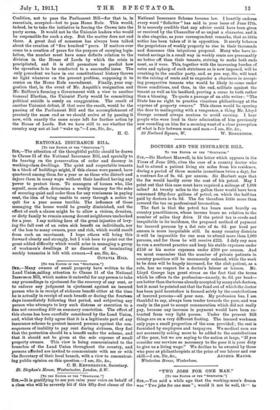DOCTORS AND THE INSURANCE BILL.
To THE EDITOR OP THE "SPECTATOR."
SIR,—Sir Herbert Maxwell, in his letter which appears in the Times of June 20th, cites the case of a country doctor who had to attend a patient living six miles from his residence, during a period of three months (sometimes twice a day), for a contract fee of 8s. 6d. per annum. Sir Herbert says that the fee would hardly cover the cost of his petrol. May I point out that this case must have required a mileage of 1,080 miles P At twenty miles to the gallon there would have been consumed fifty-four gallons of petrol, on which the half-tax paid by doctors is 6s. 9d. The fee therefore little more than covered the tax on professional locomotion.
The fact is that the petrol tax bears most heavily on country practitioners, whose income bears no relation to the number of miles they drive. If the petrol tax is crude and inequitable in its incidence, the proposed method of payment for insured persons by a flat rate of 4s. 6d. per head per annum is more inequitable still. In many country districts it will be impossible for one man to attend more than 1,000 persons, and for these he will receive £225. I defy any man to run a scattered practice and keep his stable expenses under £150 or his motor expenses under £200 per annum. And we must remember that the number of private patients in country practices will be enormously reduced, while the work to be done will be hugely increased, for the club patient, as a rule, has no respect for a doctor's labour or leisure. Mr. Lloyd George lays great stress on the fact that the terms which he offers to the profession—namely, 4s. 6d. per head— are better than the terms already accepted by many club doctors, but it must be pointed out that the fund out of which the doctor has been paid heretofore is formed solely by the contributions of insured persons—all poor men. My profession has, I am thankful to say, always been tender towards the poor, and was ready in the past to accept remuneration which did not really pay, because any increase in payment would have been ex- tracted from very light purses. Under the present Bill things are on a. very different footing. The insured workman only pays a small proportion of the sum provided ; the rest is furnished by employers and taxpayers. We medical men are not necessarily asking more to be added to the contributions of the poor, but we are saying to the nation at large, "If you consider our services so necessary to the poor it is your duty to give us a living wage." We decline to be sweated by those who pose as philanthropists at the price of our labour and our














































 Previous page
Previous page